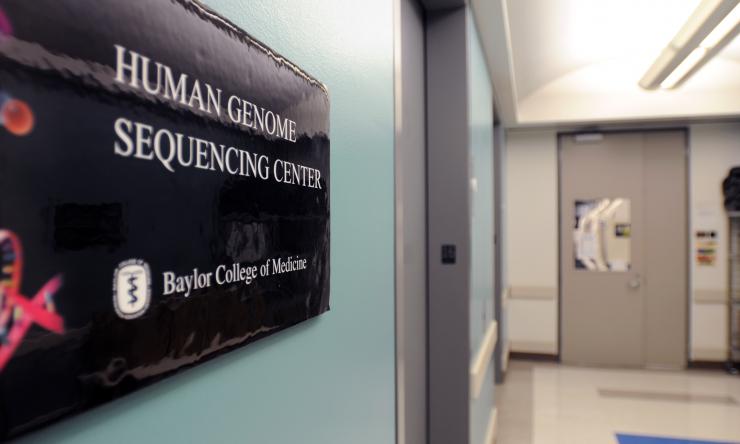Baylor’s Human Genome Sequencing Center looks to bring adult whole genome sequencing to clinical space with unprecedented NHLBI grant
The National Heart Lung and Blood Institute’s (NHLBI) Trans-Omics for Precision Medicine (TOPMed) program has named the Human Genome Sequencing Center (HGSC) at Baylor College of Medicine as a participant in a groundbreaking half-billion dollar program to bring whole genome sequencing and other –omic technologies that monitor the expression of the genome in response to the environment, to the forefront of clinical research.
Through its TOPMed program, NHLBI is expanding its dedication to advancing the understanding of the underpinnings of complex diseases and how they develop. Previously, the HGSC was awarded funding by NHLBI to sequence whole genomes for TOPMed studies such as sickle cell disease, and venous thromboembolism and will continue to expand this effort in the next phase of the program. The new contract will span five years. In addition to the whole genome sequencing component, the TOPMed program will also provide analysis of other data types over the course of the contract period, including RNA transcription sequencing, DNA methylation, metabolomics profiles, and other –omics, including analysis of the microbiome. The initial award from NHLBI supports the whole genome sequencing of 20,000 samples at the HGSC in the first year of the program.
“There is a significant need for large sample sizes; a need that goes beyond the research setting and into the clinic,” said Dr. Richard Gibbs, director of the HGSC and professor of molecular and human genetics at Baylor. “We are grateful to be a part of the TOPMed program which will allow us to access this large sample number and obtain valuable insights into adult heart disease, sickle cell disease, atrial fibrillation and other heart, lung and hematologic disorders.”
To support this trans-omic approach, the HGSC will continue its ongoing collaboration with the Alkek Center for Metagenomics and Microbiome Research (CMMR) at Baylor and The University of Texas Health Science Center at Houston (UTHealth) School of Public Health, which would aid in executing the methylation and metabolomics tasks. The team was deemed eligible to perform all elements of these additional analyses.
“The TOPMed program and resulting data will allow us to better understand the link between pediatric and adult disease genes, thereby creating enhanced diagnostics for adult diseases and disorders. There are direct clinical applications to improve and individualize care for these adult diseases within the Texas Medical Center,” said Dr. Eric Boerwinkle, dean of UTHealth School of Public Health and associate director of the HGSC.
The HGSC has been operational for more than 20 years, gaining international recognition as a large-scale DNA sequencing and analysis center, and is currently a Center for Complex Disease Genomics supported by the National Institutes of Health and the National Human Genome Research Institute. A key mission of the HGSC is to use genetic approaches to guide discovery and diagnosis of human disease, which offers insight into new therapeutic strategies, echoing the bench-to-bedside framework that is the foundation of the national Precision Medicine Initiative. This mission has been greatly enhanced and facilitated by a collaboration with Boerwinkle, who leads a group of population and data scientists at UTHealth with expertise in analyzing genomic information to discover new disease genes and improve diagnosis. The TOPMed project will better enable the HGSC and UTHealth to pursue this mission to move adult whole genome sequencing into the clinical setting, supporting the advance of precision medicine.
The whole genome and other data made available by TOPMed has the capability to be analyzed to provide a more comprehensive picture of what factors may lead to, or protect against, common disease development. The UTHealth team is one of four analysis centers in the country catalyzing new discoveries using this data.
“The TOPMed program encourages data sharing and collaboration among institutions across the United States and will encourage an integrative analysis approach, which will be crucial to understanding the mechanisms that contribute to development of these common adult diseases,” said Ginger Metcalf, director of project development at the HGSC. “The resources available to us at Baylor and in the Texas Medical Center make us uniquely poised to facilitate multi-omic approaches for the study of complex disease.”
The flow of data will begin with the HGSC, which will receive samples from NHLBI investigators. The HGSC will perform the whole genome sequencing, and is eligible for RNA sequencing, operably distributing the samples to UTHealth for methylation and metabolomics profiling, and to Baylor’s CMMR for metagenomic analysis as program needs dictate. The data from all three sources would then be funneled into a data sharing portal and relayed back to TOPMed.
“Introducing novel -omics data sources into this phase of the TOPMed program will accelerate the discovery of diagnostics and treatments in ways that are not possible with single dataset approaches. Programs such as TOPMed are paving the way for precision medicine innovations that will shape clinical practice in the near future,” said Dr. Joseph Petrosino, founding director of the Baylor CMMR.
The HGSC has increased its number of Illumina sequencing machines to accommodate the large sample size of the TOPMed program. “This represents a 30 percent increase in our whole genome sequencing capacity, allowing us to support NHLBI and other programs which seek to use genomics to better understand disease development and identify potential therapeutic targets”, said Donna Muzny, Director of Operations at the HGSC. The HGSC is prepared to leverage the framework made possible by the TOPMed program to execute other multi-omic studies.
“The NHLBI contract is a huge contribution to the research community here at Baylor, and for the Texas Medical Center as a whole. The scope of whole genome research it will allow us to execute and apply to the clinical setting is groundbreaking, and I look forward to seeing what we are able to discover in the realm of adult hematological disorders as a result,” said Dr. Adam Kuspa, senior vice president and dean of research at Baylor.










